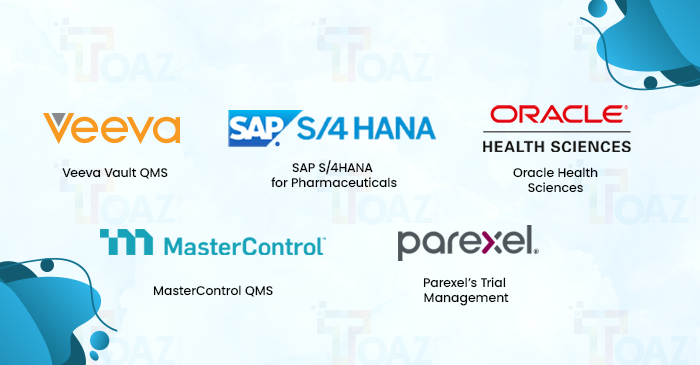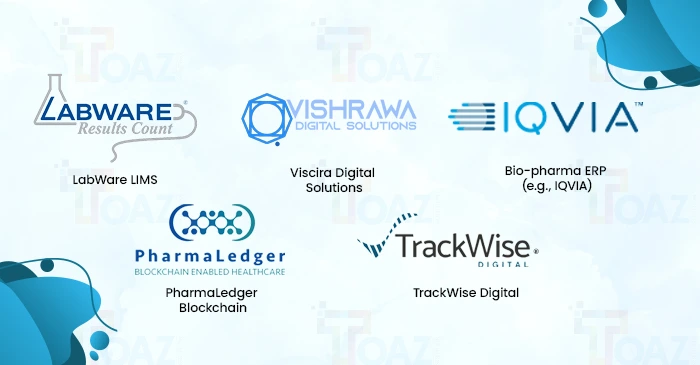Pharmaceutical software plays a vital role in making drug development, production, and sales more efficient. As the industry faces new challenges, companies turn to technology to stay ahead. These tools help ensure compliance, improve accuracy, and speed up key processes. The market is growing fast; experts say it will hit new highs by end of 2025. For pharma companies and healthcare providers, choosing the right software means gaining a big competitive edge in today’s fast-changing world.
The Evolution of Pharmaceutical Software: Key Trends and Drivers:
Rapid advancement in pharmaceutical software is thanks to automation, AI and cloud computing which support Drug discovery, clinical trials and manufacturing. It helps labs comply with regulations, make their data more secure and allows seamless integration of systems throughout the supply chain. Access through mobile devices makes it possible to watch over patients in real-time and new progress is helping doctors create personalized genetic medicines.
Why is Pharma Adopting More Software?
Big changes are happening in the industry. Risks are increasing since regulations demand more of companies and they manage a bigger amount of information every day. Using information about a patient’s badly to guide treatment is harder than one might imagine. Because of these trends, firms are motivated to adopt updated technology.
What do Industry Leaders say?
AI and cloud-based services are predicted by analysts to transform how the future operates. Top IT executives in the industry agree that making use of these tools helps employees work more effectively and reduces risks, increasing company growth.
Top 10 Pharmaceutical Software Solutions:
Choosing the best software depends on features, ease of use, integration, compliance, and reputation. Here’s a list of leading solutions that stand out this year.

1-Veeva Vault QMS.
The Veeva Vault QMS was made for the life sciences industry and works in the cloud. It eases the process for pharma companies by guiding them through quality tasks like deviations, CAPAs, audits and changes, all within a centralized and paperless environment.
| Software Name | Type / Use | Key Features | Benefits / Impact |
| Veeva Vault QMS | Cloud-based Quality Management | Document management, deviation handling, audit tracking | Maintains GMP compliance, simplifies validation |
2-SAP S/4HANA for Pharmaceuticals.
Through SAP S/4HANA, pharmaceutical companies enjoy an all-inclusive ERP solution that includes handling production, stock management, compliance regulations and finances. It improves operations by providing real-time information and helps the company satisfy all necessary requirements.
| Software Name | Type / Use | Key Features | Benefits / Impact |
| SAP S/4HANABestRx for Pharmaceuticals | ERP for Pharma Manufacturing | Real-time supply chain, regulatory reporting | Fast decisions with live data, improved flexibility and speed |
3-MasterControl QMS.
Through MasterControl QMS, companies in the pharmaceutical industry can handle and control document management, training, audits, CAPAs and a range of other tasks. It makes certain that the company’s processes are in line with both FDA and ISO requirements, so quality assurance uses it as a main tool.
| Software Name | Type / Use | Key Features | Benefits / Impact |
| MasterControl QMS | Quality Management Software | CAPA management, change control, staff training | Ensures quality globally, audit-ready records |
4-Oracle Health Sciences.
The system is used to handle clinical trial data by efficiently managing all electronic information. Trial results come more rapidly and reliably thanks to tools for electronic data management and real-time monitoring of the research.
| Software Name | Type / Use | Key Features | Benefits / Impact |
| Oracle Health Sciences | Clinical Data Management | Data collection, coding, validation, tool integration | Speeds up trials, improves data accuracy |
5- Parexel’s Trial Management.
Parexel’s tools help manage everything in clinical trials, including bringing in patients, managing study sites, setting timelines and estate complying with guidelines. It improves efficiency in trials and minimizes problems in bringing drugs to market.
| Software Name | Type / Use | Key Features | Benefits / Impact |
| Parexel’s Trial Management | Clinical Trial Management | Patient recruitment, site management, reporting | Reduces trial time and costs |

6- LabWare LIMS.
A LabWare LIMS system is put in place to process, control and check lab records, automate many laboratory jobs and meet all regulatory standards. It is perfect for use in pharmaceutical labs that must handle intricate tests and follow samples.
| Software Name | Type / Use | Key Features | Benefits / Impact |
| LabWare LIMS | Laboratory Information Management System | Sample tracking, lab instrument integration, report generation | Ensures test quality, meets regulations |
7- Viscira Digital Solutions.
Viscira provides digital solutions particularly designed for pharmaceutical companies, including 3D animations, virtual reality and interactive displays. Medical animation is used in marketing, teaching and training to clarify complicated medical matters.
| Software Name | Type / Use | Key Features | Benefits / Impact |
| Viscira Digital Solutions | Digital Marketing & Patient Engagement | Multi-channel campaigns, data analytics, regulatory compliance | Boosts outreach, supports patient education |
8- Bio-pharma ERP (e.g., IQVIA).
Biopharma businesses use IQVIA’s ERP tools to handle clinical records, supply chains and commercial knowledge. All elements necessary for basing decisions on such as analytics, compliance and evidence from life outside the lab, are combined on the platform.
| Software Name | Type / Use | Key Features | Benefits / Impact |
| Bio-pharma ERP (e.g., IQVIA) | ERP for Biopharma | Batch tracing, inventory and supply management | Supports complex production, maintains organization |
9- PharmaLedger Blockchain.
PharmaLedger uses blockchain to keep medicines safe and visible and prevent false information during their movement along the supply chain. Through the use of the blockchain, drug producers can track their products, fight counterfeits and fulfill all requirements.
| Software Name | Type / Use | Key Features | Benefits / Impact |
| PharmaLedger Blockchain | Blockchain for Supply Chain Security | Medicine traceability, anti-counterfeiting, smart contracts | Increases transparency, strengthens trust |
10- TrackWise Digital.
In the cloud, TrackWise Digital assists organizations in dealing with deviations, complaints, CAPAs and audits. It is built to be enabled more quickly, operate more smoothly and adapt better for expansions than the classic TrackWise system.
| Software Name | Type / Use | Key Features | Benefits / Impact |
| TrackWise Digital | Cloud Quality Management | Risk and complaint handling, CAPA management | Improves quality, ensures regulatory compliance |
Conclusion:
Selecting suitable pharma software helps ensure that your operation works smoothly, follows the law and stays ahead of the competition. The tools make things more efficient, ensure rules are meet and let companies keep ahead in their industry. It is necessary for companies to achieve the following:
Pay attention to what they need.
Pick tools that are simple to link with the software you use already.
Follow new policies as they appear.
Things are moving rapidly in the pharma industry. Using the latest software solutions can boost your business’s growth in the year ahead and beyond. Look for tools that help your company achieve its targets and address its difficulties.





































